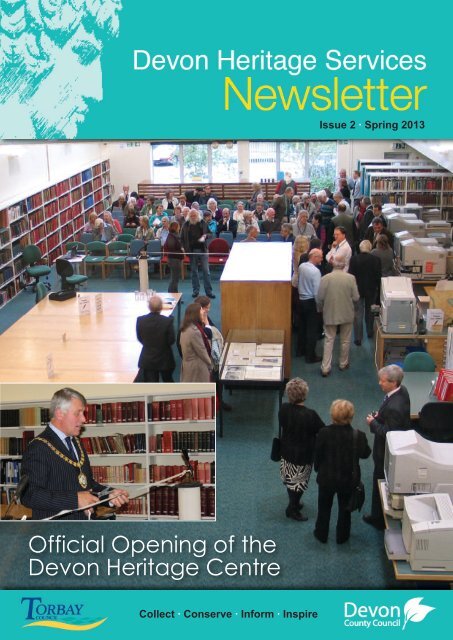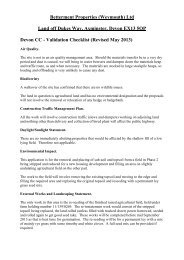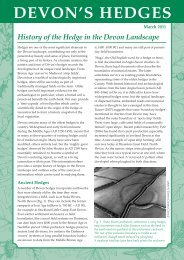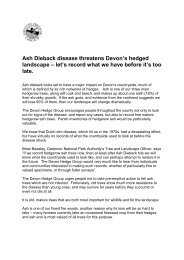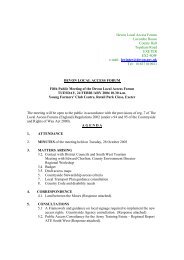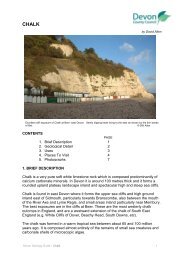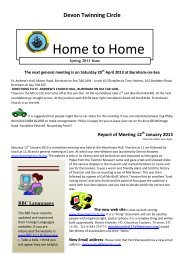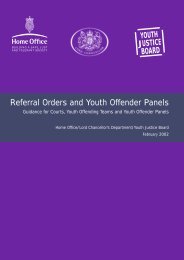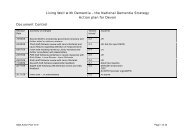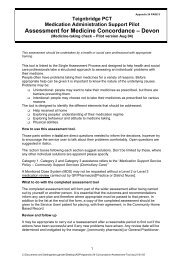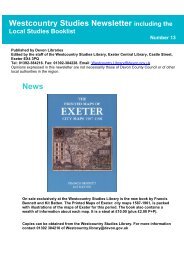Spring 2013 - Devon County Council
Spring 2013 - Devon County Council
Spring 2013 - Devon County Council
You also want an ePaper? Increase the reach of your titles
YUMPU automatically turns print PDFs into web optimized ePapers that Google loves.
Official Opening of the<br />
<strong>Devon</strong> Heritage Centre<br />
Collect . Conserve . Inform . Inspire<br />
Issue 2 . <strong>Spring</strong> <strong>2013</strong>
<strong>Devon</strong><br />
Heritage<br />
Services<br />
Great Moor House<br />
Bittern Road<br />
Sowton<br />
Exeter EX2 7NL<br />
Email<br />
devrec@devon.gov.uk<br />
Web www.devon.gov.uk<br />
/record_office<br />
Tel 01392 384253<br />
Fax 01392 384256<br />
Editor<br />
Brian Carpenter<br />
Community and Education<br />
Development Officer<br />
Design<br />
Corporate Communications<br />
/Sally Skilton<br />
Please see our website<br />
for times of opening<br />
Front Cover<br />
Official Opening of the<br />
<strong>Devon</strong> Heritage Centre,<br />
22nd October 2012.<br />
Editorial<br />
<strong>Devon</strong> Heritage Centre Opens!<br />
The <strong>Devon</strong> Heritage Centre at Great Moor House, Sowton, Exeter is bringing<br />
together under one roof the rich and varied collections of local studies and<br />
archive resources cared for by <strong>Devon</strong> <strong>County</strong> <strong>Council</strong>. The completion of the<br />
first stage in this process was celebrated at our Official Opening by the<br />
Chairman of the <strong>County</strong> <strong>Council</strong>, <strong>Council</strong>lor Jerry Brook, on 22 October 2012.<br />
Before cutting the ribbon, <strong>Council</strong>lor Brook told the invited audience that<br />
having such a wide range of records available in one place makes the<br />
Heritage Centre “one of the most important facilities in the county today”.<br />
Dr Phil Norrey, Chief Executive of <strong>Devon</strong> <strong>County</strong> <strong>Council</strong>, spoke of the significance of<br />
bringing historical resources together and how they can also bring people together, adding<br />
that “this is a service we can truly be proud of. In these times of financial constraints, it is<br />
important to hold on to such a facility; some things, once you have lost them, you can never<br />
get them back”.<br />
I also took the opportunity to say a few words at the conclusion of the formal Opening<br />
ceremony, and this is an edited version of my speech:<br />
“I would like to remind you all that today’s event marks the completion of the first phase only<br />
of our Heritage Centre project. The end result will be the complete integration of both<br />
county archive and local studies collections but at present we only have space to take the<br />
reading room stock from the former Westcountry Studies Library, together with the library of<br />
the <strong>Devon</strong> & Cornwall Record Society (to which we are offering, with the kind agreement of<br />
the Society, free public access for the first time). Additional storage areas elsewhere in this<br />
building will be available to us next year and, in the meantime, the local studies collections<br />
remaining at Exeter Central Library will continue to be publicly accessible. We will also be<br />
taking in the historic registers of births, marriages and deaths from the county registration<br />
service next year. These collections will be joining that of the National Meteorological Office<br />
Archive, with whom we have been sharing accommodation since 2005, to create a really<br />
comprehensive and publicly accessible resource under one roof.<br />
Looking further ahead, for us this is only the start, the springboard for what we hope will be<br />
a very different way of connecting with people, both our regular users and those who may<br />
not even be terribly aware of what we do. If I had to choose one word to sum up what I<br />
mean by that, it would be the word: ‘community’. Indeed, it is very fitting that we now come<br />
under the <strong>County</strong> <strong>Council</strong>’s ‘Services for Communities’ umbrella. The past couple of years,<br />
during which dire economic conditions have forced all of us to re-consider what we do and<br />
how we can best achieve it, have very clearly demonstrated to us that we are connected in<br />
a host of different ways to a huge community of individuals and organisations across the<br />
world with an interest in the heritage of <strong>Devon</strong>. There is an enormous amount of really<br />
valuable collecting, recording and researching work going on across this community but<br />
there is a very obvious need for an overriding co-ordinating body to provide professional<br />
assistance, avoid duplication of effort and to maximise outcomes. I see this Centre as the<br />
natural provider of that supporting role through the mechanism of a new body we are calling<br />
the <strong>Devon</strong> History Forum. We now have excellent facilities here for hosting meetings,<br />
presentations and training events and we will be showcasing these at our next annual Open<br />
Day on Saturday 16 March <strong>2013</strong>. We can assist local history groups with all aspects of their<br />
activities, from collecting to preservation, access and presentation, and we can involve<br />
communities in our own projects, both through volunteering opportunities and by including<br />
work with specific groups in our external funding bids, or by advising and supporting groups<br />
who are submitting bids of their own. I want us to find ways to ensure that we are both<br />
approachable and available to assist in whatever ways we can, and the History Forum is a<br />
central element of that intent.<br />
I have always been an advocate of the value of community heritage work and we are very<br />
keen to support the huge range of such activity in practical ways. A couple of examples of<br />
current initiatives we are working on: since 2006 I have been managing a community<br />
2 <strong>Devon</strong> Heritage Services Newsletter
Editorial<br />
archives project in north <strong>Devon</strong> called Explore North <strong>Devon</strong><br />
– this began life as an Archives 4 All project working with 5<br />
communities to develop and digitise their collections and<br />
present them on the Internet. Now the project has over 40<br />
participating communities and we are currently in the<br />
process of migrating the huge amount of data collected by<br />
them to a more sustainable community archives website<br />
offering enhanced geographical search facilities, social<br />
media links and so on. We will be assisting other groups<br />
across <strong>Devon</strong> to join this resulting community to create an<br />
ever growing ‘<strong>Devon</strong> Heritage’ online resource. Alongside<br />
this, we are submitting a substantial Heritage Lottery Fund<br />
application called ‘Explore <strong>Devon</strong>’s Heritage’ to fund work<br />
with up to 30 <strong>Devon</strong> communities over two years on local<br />
research projects they want to explore, data from which will<br />
be added to the website I have just mentioned.<br />
Finally, I would like to say that the commitment shown by<br />
our <strong>County</strong> <strong>Council</strong> in bringing together its historic<br />
collections to create this Heritage Centre is not just a<br />
means to streamline services and achieve economies of<br />
scale; there is a genuine appreciation that what the <strong>Council</strong><br />
possesses in its unique heritage collections, built up over<br />
many centuries and stretching back a millennia, is a<br />
treasure house of resources that holds almost limitless<br />
possibilities for connecting with many different agendas,<br />
economic, social and educational as well as historical.<br />
There is literally something for everyone in the collections<br />
we hold in both our Exeter and Barnstaple centres; witness<br />
the huge appeal that family history currently has, for<br />
example. Exploring our heritage makes us feel more<br />
connected to a family, a place, a community, or to society<br />
in general, and as such I have always been convinced that<br />
it has a wider social role. You may remember the<br />
widespread rioting that took place in our cities in 2011; I<br />
recall watching various TV commentators trying to explain<br />
what was going on at the time and the morning after a<br />
particularly bad night they were talking about it to <strong>Devon</strong><br />
author, Michael Morpurgo, who said a very insightful thing<br />
that, for me, cut right through to the heart of the matter: he<br />
felt that the main contributing factor was that people no<br />
longer had any sense whatsoever of belonging to their<br />
communities. I am convinced that heritage services have<br />
an enormous potential to provide people with precisely that<br />
sense of belonging, and, in such a context, a huge<br />
responsibility to do just that. With no real end in sight to the<br />
current economic decline, and things perhaps set to get a<br />
great deal worse, increased social unrest may well be an<br />
inevitable consequence and we therefore have a crucial<br />
role to play in contributing whatever we can to combat<br />
instability in our communities. Continued investment in our<br />
‘cultural capital’ when seen in this light begins to look like<br />
something of a future proofing social imperative from my<br />
perspective and something that should be central to<br />
government and local authority strategies.<br />
Tim Wormleighton<br />
Heritage Services Manager<br />
A Christmas Carol<br />
When sorting through a recent deposit of records from the<br />
parish of Chulmleigh, Heritage Centre staff came across a<br />
copy of a printed hymn sheet which had seen much better<br />
days. The hymn was entitled a ‘Hymn for Christmas Day in<br />
score Figured for the Organ & Piano Forte composed and<br />
most respectfully Dedicated to the Choir of Chulmleigh by<br />
William Howell’. William Howell apparently came from<br />
Chulmleigh, and presumably lived there, but the score was<br />
printed in London by Astor and Company, ‘Musical<br />
Instrument Manufacturers’ at 79 Cornhill.<br />
We suspect that the hymn was specially composed for the<br />
parish choir, and, given the poor condition of the sheet, it<br />
must have been well used in the early years following its<br />
composition, although it is probably many years since the<br />
music was performed or the hymn was sung.<br />
Unfortunately the score was discovered too late to be<br />
restored in time for Christmas 2012, but once our<br />
conservation staff have worked their magic it should be<br />
available to be sung again in Chulmleigh for many<br />
Christmases to come.<br />
<strong>Spring</strong> <strong>2013</strong> 3
<strong>Devon</strong> Heritage Services<br />
New Staff<br />
Bob Bennett<br />
Project Archivist<br />
‘The Right to Remain Silent?’<br />
I’m a new face in the Heritage<br />
Service this year. Originally from<br />
Cheshire, I’ve completed two<br />
degrees in Medieval History at<br />
Aberystwyth, in the process of<br />
which I discovered the wonderful<br />
world of archives. After completing<br />
a training year at Special<br />
Collections, Palace Green Library,<br />
Durham, I went on to take an archival qualification at<br />
Aberystwyth, completing in June 2011. Since August 2012 I’ve<br />
been working as Project Archivist on the <strong>Devon</strong> Quarter<br />
Sessions Records, a role I hugely enjoy. I have a lot of different<br />
hobbies and interests, including hiking and hill walking,<br />
photography, writing, history, and travel, and I’m also a big fan<br />
of steam railways, so <strong>Devon</strong> is ideal, really! I’m looking forward<br />
to getting out and about on Dartmoor this year and if I’m feeling<br />
particularly bold I might even try the Ten Tors Challenge. You<br />
can follow the progress of my project at<br />
www.devonquartersessions.wordpress.com; feel free to leave<br />
any comments and questions you may have.<br />
Lucy Browne<br />
Heritage Assistant<br />
Lucy Browne comes from a long<br />
line of Anglican clergymen and<br />
grew up in Topsham, where her<br />
parents owned the Topsham<br />
Bookshop. She spent seventeen<br />
years in Wales, during which she<br />
completed a history degree at St<br />
David’s University College,<br />
Lampeter and a PGCE, and taught<br />
in various capacities while turning a ruined Pembrokeshire<br />
church into a house with her husband, and producing three<br />
children. The family returned to <strong>Devon</strong> in 2001, when Lucy<br />
became an assistant in the Westcountry Studies Library. Lucy’s<br />
specialism is Family History and she is working towards a<br />
professional genealogical qualification with the Institute of<br />
Heraldic and Genealogical Studies in Canterbury. Spare time is<br />
scarce after course work is completed, the dog walked and the<br />
fridge filled, but she occasionally sings in her church choir at St<br />
Michael’s, Mount Dinham, and escapes outside on the pretext<br />
of gardening which ensures the family makes itself scarce.<br />
Other New Staff<br />
As well as Bob and Lucy, we have also been joined by Tony<br />
Rouse, who has joined the team of Heritage Assistants, along<br />
with Mandy Caine, Mike Dowell, Josie Halloran, Eliza Newton,<br />
James Ward and his former colleague Lucy Browne. Tony will<br />
be a familiar face to many among the local history community<br />
in <strong>Devon</strong> after more than twenty years working in the old<br />
Westcountry Studies Library in central Exeter.<br />
Earlier in 2012 we were joined by Stuart Tyler. Stuart is an<br />
archivist and comes from south <strong>Devon</strong>. He has previously<br />
worked at the Bury St.Edmunds branch of the Suffolk Record<br />
Office, and at the Dorset History Centre.<br />
Acquisitions of<br />
Special Interest<br />
Between the start of November 2011 and the end<br />
of October 2012, the <strong>Devon</strong> Heritage Centre -<br />
renamed after the amalgamation of the <strong>Devon</strong> Record<br />
Office and the Westcountry Studies Library in the<br />
autumn of 2012 - received a varied and interesting<br />
range of accessions.<br />
Parish records were deposited by Aylesbeare (8262,<br />
8285), Cheldon (8233), Coffinswell (8208), Combpyne with<br />
Rousdon (8401), Cullompton (8282, 8327, 8345),<br />
Culmstock (8174), Dittisham (8260), Drewsteignton (8252),<br />
Exeter Central (8364), Feniton, Buckerell and Escot<br />
(8289), Halberton (8274, 8443), Hatherleigh (8382),<br />
Highweek (8393, 8405), Holcombe Rogus (8273), Ide<br />
(8172, 8418), Kingsteignton (8333), Milton Damerel (8207),<br />
Moretonhampstead (8317), Newton St.Cyres (8353),<br />
Okehampton (8155), Ottery St.Mary (8288), Paignton<br />
St.John (8334), Stoke Fleming (8244), Templeton<br />
(8412),Thornbury (8209) and Woodleigh (8173).<br />
Collections of non-conformist and other church records<br />
were also received from, among others, High Street<br />
Plymouth Brethren Chapel, Crediton (8341), Crediton<br />
Unitarian Church (8429), Cullompton Methodist Church<br />
(8343), Cullompton Unitarian Church (8425), Exeter<br />
Unitarian Fellowship (8426), Exeter Coast and Country<br />
Methodist Circuit (8229), Exminster Methodist Church<br />
(8304), Honiton Methodist Circuit (8347),<br />
Moretonhampstead Unitarian Chapel (8428), Newton<br />
Abbot Unitarian Church (8423), Plymouth Unitarian Church<br />
(8424), Sidmouth Unitarian Chapel (8430), Sidmouth and<br />
Bridport Methodist Circuit (8346), South <strong>Devon</strong> Unitarian<br />
Ministry (8431), Tiverton Methodist Circuit (8344), Tiverton<br />
United Reformed Church (8278, 8295, 8303, 8386) and<br />
Torquay Unitarian Church (8427).<br />
Parish council records were deposited by the councils of<br />
Aylesbeare (8287), Bridford (8311), Culmstock (8255,<br />
8449), Drewsteignton (8319), Ipplepen (8153), Kenton<br />
(8286), Morchard Bishop (8422), St.Giles in the Heath<br />
(8318), Sandford (8421) and Stoke Fleming (8238).<br />
We have also received school records relating to<br />
Alphington Primary School (8394), All Saints Primary<br />
School, Babbacombe, Torquay (8315), Blackawton Primary<br />
School (8388), Chestnut Primary School, Brixham (8312),<br />
Chudleigh Primary School (8332), Clyst Honiton Primary<br />
School (8374), Cockington Primary School (8314), Queen<br />
Elizabeth’s School, Crediton (8232), Dalwood Primary<br />
School (8222), the old Rack Street Infants School in Exeter<br />
(8440), St.Peter’s Church of England School, Exeter<br />
(8225) and its forerunner Hele’s School (8370), Halberton<br />
Primary School (8396), Lifton Infants School (8167), King’s<br />
4 <strong>Devon</strong> Heritage Services Newsletter
School, Ottery St.Mary (8165), Paignton Community<br />
College (8436), Stoke Fleming Primary School (8387),<br />
Stokenham Primary School (8235), Priory Roman<br />
Catholic Primary School, St.Marychurch, Torquay (8313)<br />
and Homelands Primary School, Torquay (8316), while<br />
other educational records came in which relate to<br />
St.Luke’s College, Exeter (8164).<br />
Deposits of business records are rarely very numerous,<br />
but, as is often the case, the most significant collections<br />
of this type comprise collections of deeds and other legal<br />
documents deposited by firms of solicitors. For example,<br />
the Sidmouth office of solicitors Gilbert Stephens, gave<br />
us a large collection of documents relating to properties,<br />
mostly in east <strong>Devon</strong>, dating from the eighteenth century<br />
to the twentieth (8171), and Peter, Peter and Wright, of<br />
Okehampton, a similar collection relating to west <strong>Devon</strong><br />
(8251), the earliest item of which dates from 1574.<br />
From the political world, we have received some minutes<br />
and other records from the Torridge and West <strong>Devon</strong><br />
Conservative Association (8265) and we purchased a<br />
minute book covering 1816-1833 of the ‘<strong>Devon</strong> <strong>County</strong><br />
Club’, a club of Whig supporters among the local<br />
gentry (8410).<br />
Other interesting collections received during the period<br />
under review included material produced during the ‘The<br />
School Looks Around’ art project at two <strong>Devon</strong> schools in<br />
2010 and 2011 (8146, 8147); a collection of material<br />
relating to an Exeter-born actor called Peter Clapham<br />
who appeared in various popular television series and<br />
films between the 1970s and 2001 (8335); a photograph<br />
and magazine relating to a temporary hospital located in<br />
central Exeter during World War One (8358); oral history<br />
material relating to <strong>Devon</strong>’s hedges (8391) and two<br />
photocopied letters from Admiral Horatio Nelson (8446).<br />
Not all these records are yet available for consultation.<br />
We shall endeavour to make them accessible as soon as<br />
possible, and staff will be happy to advise about the<br />
accessibility of a particular collection. Full details of these<br />
collections can be found on our online catalogue:<br />
http://app-calmview.devon.gov.uk/CalmView/<br />
North <strong>Devon</strong> Record Office Acquisitions<br />
November 2011 to October 2012<br />
Since the previous edition of this newsletter, the North<br />
<strong>Devon</strong> Record Office in Barnstaple has received several<br />
additional deposits from the following north <strong>Devon</strong><br />
parishes: Bratton Fleming (1506A); Challacombe<br />
(3399A); West Worlington (336A); West<br />
Woolfardisworthy (922A); Berrynarbor (3921A) and<br />
Bishops Tawton (1469A). Records were also received<br />
from Ilfracombe Methodist Circuit (2334), Barnstaple<br />
Methodist Circuit (2347), Bude Methodist Circuit (2926),<br />
Bideford Methodist Circuit (2237), Milton Dameral<br />
Methodist Chapel (B1085), Braunton Evangelical Church<br />
(B1095) and Barnstaple Baptist Church (B419).<br />
Other deposits of note include school log books, 1875-1990<br />
for Bideford church schools (3238C); Berrynarbor school<br />
admission registers, 1874-1954 (B1106); records collected<br />
by Harold Jester - a former school headmaster at Lynton -<br />
that include Lynton and Barbrook school log books, 1930-<br />
1975; manager’s minutes, 1902-1932; an admission<br />
register, 1873-1902 and punishment books, 1900-1945, as<br />
well as a copy of the Lynton tithe apportionment, 1839<br />
(B1112). North <strong>Devon</strong> District <strong>Council</strong> transferred some of<br />
its old leases, agreements and local government orders,<br />
1898-1972 (3760) to the custody of the Record Office and<br />
Lynton and Lynmouth Town <strong>Council</strong> transferred an<br />
inclosure map and award for Lyn Cleeve and Lyn Down,<br />
1860; water works plans, 1902 and some undated tithe<br />
map copies (B1114).<br />
Wages books, purchase and sales ledgers and various<br />
other documents, 1926-1982 of James Tapscott & Sons,<br />
glove makers, Great Torrington (B1084) were deposited as<br />
were articles of association, prospectuses, share<br />
certificates, accounts, correspondence and machinery<br />
plans, 1879 -1980 from the North <strong>Devon</strong> Clay Company<br />
(B1087). Also acquired by the Record Office were plans of<br />
the Barnstaple to Ilfracombe railway, 1971 & 1974 (B1119);<br />
Stevens family of Cross and Winscott title deeds etc.<br />
(1648) -1842 (B1107); Tawstock and South Molton title<br />
deeds and agreements, 1503-1664 with a large bundle of<br />
Tawstock apprenticeship indentures, 1700-1843 (B1115);<br />
films and photographs of sailing events and shows etc. in<br />
and around Instow, 1930s-2006 (B1083); title deeds and<br />
associated documents of the old Mortehoe Hotel, 1882-<br />
1977 (B1090) and a 1748 attested copy of a bond of<br />
obligation for £1,000 between William Nichols and William<br />
Elliss, both of Appledore (B1118). The Inner Wheel Club of<br />
Barnstaple deposited records dating from their formation in<br />
1945 (B1116) and Barnstaple Longbridge Townswomen’s<br />
Guild also deposited their records, 1940-2010 (B1105).<br />
Finally, the following Women’s Institutes have deposited<br />
records and/or photographs at the Barnstaple Office over<br />
the last year: Goodleigh, 1995-2007 (B680); Frithelstock,<br />
1938-2005 (B1103) and Bishops Tawton, 1938-2000<br />
(B1109).<br />
Please note that some of these deposits, in particular the<br />
larger collections such as B1084 and B1087, have not yet<br />
been catalogued and, therefore, may not be available for<br />
consultation. Enquiries about the availability of the<br />
acquisitions referred to in this article should be made to<br />
staff at the North <strong>Devon</strong> Record Office.<br />
Our thanks go to the<br />
<strong>Devon</strong> Family History<br />
Society for providing<br />
a grant which allowed<br />
us to purchase some<br />
of the items<br />
mentioned above.<br />
Instow (NDRO B1083)<br />
<strong>Spring</strong> <strong>2013</strong> 5
Telling our Stories, Finding our Roots<br />
Telling our Stories, Finding our Roots: Exeter’s<br />
Multi-coloured History, is a Heritage Lottery<br />
Fund-supported project which seeks to trace<br />
the lives and journeys of immigrants to Exeter<br />
over many centuries.<br />
At the core of the project is a team of volunteers which has<br />
been recruited from the ethnically diverse population of<br />
modern Exeter. On Monday 19th November 2012, many of<br />
these volunteers, together with the project co-ordinator,<br />
Ghee Bowman, visited the <strong>Devon</strong> Heritage Centre for a<br />
training day designed to introduce them to the resources -<br />
here, online, and in other archives - which can be used to<br />
Open Day<br />
Following the success of the first <strong>Devon</strong><br />
Heritage Services Open Day last March, we<br />
will be staging another on Saturday 16th<br />
March <strong>2013</strong>.<br />
The theme of the day will be Partnerships and Projects,<br />
and it will feature speakers including Tim Wormleighton,<br />
Heritage Services Manager, who will be talking, among<br />
other things, about the new <strong>Devon</strong> History Forum, Bob<br />
Bennett, the <strong>Devon</strong> Quarter Sessions Project Archivist,<br />
Matt Greenhall from The National Archives and Emma<br />
Waldron, who will be talking about the Mapping the<br />
<strong>County</strong> project. There will also be stands displaying<br />
information relating to local groups and a repeat of the<br />
behind-the scenes tours of strongrooms which proved so<br />
popular last year.<br />
Keep an eye on our website - http://www.devon.gov.uk/<br />
record_office.htm - for further details.<br />
trace the lives and origins of people who have come from<br />
abroad to make their homes in Exeter.<br />
The group included people with origins in Uganda, Egypt,<br />
Slovakia and the United States of America, among other<br />
countries, and, as such, was almost certainly the most<br />
ethnically diverse group ever to visit any of <strong>Devon</strong>’s<br />
archives.<br />
It was a pleasure to welcome the volunteers to the<br />
Heritage Centre and it was gratifying to see how interested<br />
they were in the range of material on display. We look<br />
forward to meeting some of them again as their research<br />
progresses.<br />
Three new publications on<br />
sale at the Heritage Centre<br />
Taking pride of place is the first published work by<br />
Tim Wormleighton, our Heritage Services Manager.<br />
Entitled Title Deeds for Family Historians, and<br />
published by The Family History Partnership (£4.95), the<br />
book covers the different types of title deed which family<br />
historians are likely to come across in the course of their<br />
research. Tim describes how the documents came to have<br />
their names, how they originated - usually among the<br />
darkest recesses of medieval land law - the language<br />
used, and the reasons why certain documents fell out of<br />
use and were replaced by others. The book also includes<br />
photographs of the major types of deed.<br />
The second recent publication has been described<br />
as ‘the first in-depth study’ of its subject. <strong>Devon</strong>’s<br />
Ancient Bench Ends, by Todd Gray (Mint Press, £17.99).<br />
Finally, we have Marriage Law for Genealogists,<br />
by Professor Rebecca Probert (Takeaway<br />
Publishing, £9.99).<br />
6 <strong>Devon</strong> Heritage Services Newsletter
The Right to<br />
Remain Silent?<br />
The Right to Remain Silent?, the <strong>Devon</strong> Quarter Sessions<br />
cataloguing project, began in August and has continued apace<br />
over recent months. In October, 1912 documents were<br />
catalogued and a whole host of crimes described, from a<br />
‘Skimmington Ride’ in Aveton Giffard to bull-baiting in Totnes.<br />
Over 5,000 documents have been catalogued since August and we<br />
are now progressing into the 1740s, with evidence emerging of the<br />
impact of terrible weather conditions throughout 1740 leading to a<br />
spate of subsistence-related crimes. These crimes mainly involve<br />
theft of food and fuel, as the inhabitants of <strong>Devon</strong> battled to get to<br />
grips with the unseasonable weather, which affected all of Europe<br />
and is known to have caused enormous hardship in Ireland at the<br />
same time. The uncompromising Justices of the Peace clamped<br />
down hard on those unlucky enough to be caught stealing to<br />
survive, with a spate of transportations taking place at the<br />
Midsummer sessions that year.<br />
The launch of the new Heritage Service in October 2012 provided<br />
an opportunity to deliver a talk on the project to a wide range of<br />
interested parties from the council and the community, and it is<br />
hoped that further talks will be given later in the year.<br />
Several volunteers have settled into the project so far, and are<br />
taking part in a range of tasks, including sorting documents and<br />
background research.<br />
Our conservators are tirelessly plugging away to repackage the<br />
bundles as the cataloguing continues, and plenty of interesting<br />
material is being discovered and placed on the project blog. If you’d<br />
like to find out more about the project as we enter this exciting new<br />
historical decade or would like to find out more about how to<br />
volunteer, please feel free to send an email to me at<br />
robert.bennett@devon.gov.uk, or pop into the searchroom and ask<br />
for the Quarter Sessions project archivist. I’ll be glad to answer any<br />
questions you may have. Finally, weekly updates on items of<br />
interest that have been found in the records can be seen at the<br />
project blog at: www.devonquartersessions.wordpress.com.<br />
Bob Bennett<br />
Project Archivist, The Right to Remain Silent?<br />
Hudibras Encounters the Skimmington, Hogarth, 1822.<br />
Palaeography Course<br />
In the autumn of 2012 the <strong>Devon</strong> Heritage<br />
Centre staged a series of workshops<br />
aimed at people wishing to develop their<br />
skills in reading historical documents. The<br />
six week course was taught by Dr. John<br />
Booker, one of the centre’s regular<br />
volunteers, who is both a retired archivist<br />
and a very experienced palaeography<br />
tutor.<br />
Fifteen students participated in the course,<br />
which concentrated on the types of document<br />
and styles of handwriting commonly used in<br />
Britain between the mid-seventeenth and the<br />
early nineteenth centuries. As well as<br />
assisting the students with reading the<br />
handwriting, John Booker explained the<br />
structure and purposes of the documents<br />
themselves.<br />
Feedback from the course participants has<br />
been very positive, and we will be running a<br />
similar course in April and May <strong>2013</strong>. At this<br />
stage we have not made a definite decision<br />
about whether to tailor the course to the<br />
requirements of beginners or more<br />
experienced students, so if you have any<br />
views about which would be preferable for<br />
you, please e-mail our Community and<br />
Education Development Officer, Brian<br />
Carpenter, at brian.carpenter@devon.gov.uk.<br />
Full details of the course will appear on our<br />
website soon.<br />
<strong>Devon</strong> History Forum<br />
<strong>Devon</strong> Heritage Services is delighted to<br />
announce the launch of the <strong>Devon</strong> History<br />
Forum, which will act as a co-ordinating forum<br />
providing mutual support, advice, information,<br />
training opportunities, events and online<br />
networking for all groups, organisations and<br />
bodies interested in exploring, collecting and<br />
promoting all aspects of the unique history<br />
and heritage of the county of <strong>Devon</strong>. We now<br />
have a ‘<strong>Devon</strong> History Forum’ page on<br />
Facebook to act as a channel for discussion,<br />
posting news, advertising coming events and<br />
generally encouraging the development of an<br />
online <strong>Devon</strong> History community that is open<br />
to all, amateur and professional alike, with<br />
similar interests and concerns. So, if you are<br />
involved with a local history group in <strong>Devon</strong>,<br />
please check out our Facebook page, spread<br />
the news or contact us to discover more about<br />
joining the Forum.<br />
<strong>Spring</strong> <strong>2013</strong> 7
Friends of<br />
<strong>Devon</strong>’s<br />
Archives<br />
In 2012 the Friends of <strong>Devon</strong>’s Archives<br />
continued to act as a valuable partner and<br />
associate to the <strong>Devon</strong> Heritage Centre and the<br />
county’s other archive repositories.<br />
In March the Friends - having been closely involved<br />
with the event’s conception and planning - were<br />
among the many societies represented at the first<br />
Open Day at Great Moor House, which was designed<br />
to enable a range of local societies to display<br />
information relating to their projects and research.<br />
There was also a programme of strongroom tours,<br />
conservation advice and speakers, chaired by Peter<br />
Towey of the FoDA committee. The day was a great<br />
success, attracting some 500 people.<br />
In April, the Friends’ spring conference, Plymouth<br />
People Through the Ages, took place at Plymouth<br />
University, with a range of speakers addressing<br />
aspects of the city’s history, including the Plymouth<br />
academics Alston Kennerley and Mark Brayshay and<br />
the former FoDA committee member Jill Drysdale.<br />
In June the Friends collaborated with the <strong>Devon</strong> and<br />
Cornwall Record Society on a conference, Medieval<br />
Exeter, which was held at Exeter Guildhall.<br />
In July, and once again in Plymouth, the Friends,<br />
together with the <strong>Devon</strong> Heritage Centre and the<br />
Plymouth and West <strong>Devon</strong> Record Office, were<br />
represented at Hands on Plymouth’s History, at the<br />
city’s Guildhall, a day which showcased the work of<br />
many of the groups, institutions and individuals<br />
engaged in safeguarding and representing<br />
Plymouth’s rich heritage.<br />
In October the Friends AGM and Conference, entitled<br />
The Applied Arts in <strong>Devon</strong>, was held at <strong>County</strong> Hall in<br />
Exeter, with speakers which included the FoDA<br />
President, John Allan, and Chairman, Todd Gray, and<br />
Clive Easter, of the Church Monuments Society.<br />
As well as staging events, the Friends have assisted<br />
the county’s archives by continuing to exert pressure<br />
on Plymouth City <strong>Council</strong> to find alternative premises<br />
for the Plymouth and West <strong>Devon</strong> Record Office, and<br />
have also contributed financially to the purchase of<br />
documents for the <strong>Devon</strong> Heritage Centre, the North<br />
<strong>Devon</strong> Record Office and the Plymouth and West<br />
<strong>Devon</strong> Record Office.<br />
Outreach<br />
One of the principal aims of the heritage service over<br />
the past year has been to get out into the community<br />
and enhance people’s knowledge of what we do and<br />
the services we provide. Since the last edition of this<br />
newsletter in early 2012, members of staff have been<br />
involved with a wide range of events, both at the<br />
Heritage Centre and elsewhere.<br />
In late May 2012, Brian Carpenter, Community and<br />
Education Development Officer, spoke at a seminar for<br />
local history societies from throughout the Dartmoor region,<br />
hosted by the Dartmoor National Park Authority at their<br />
headquarters in Bovey Tracey. This was an excellent event<br />
which showcased the extent of interest in local history in<br />
that part of <strong>Devon</strong> and gave us the opportunity to tell the<br />
assembled society representatives about our plans for the<br />
future.<br />
Last June members of staff attended the <strong>Devon</strong> Family<br />
History Society’s ‘Summer Special’ in Exeter and an event<br />
at the Royal Albert Memorial Museum organised by the<br />
BBC to tie in with their television series ‘The Great British<br />
Story’, presented by Michael Wood. In July the centre was<br />
represented at the annual ‘Hands on Plymouth’s History’<br />
event at Plymouth Guildhall, which gave us the chance to<br />
liaise with members of the local history community in<br />
Plymouth, something we are rarely able to do.<br />
As usual in September we gave behind-the-scenes tours of<br />
the office as part of the nationwide Heritage Open Days<br />
programme, and, later in the month, we assisted <strong>Devon</strong><br />
Family History volunteers to staff the Federation of Family<br />
History Societies’ stand at the annual Creative Stitches and<br />
Hobbycrafts show at Westpoint, near Exeter. Brian<br />
Carpenter also attended the first Blackdown Hills Heritage<br />
Day at Dunkeswell, a very well-attended event which acted<br />
as a focus for representatives of historical, cultural and<br />
artistic groups from the Blackdown Hills region of <strong>Devon</strong><br />
and Somerset.<br />
In the latter months of the year we have been present at the<br />
Annual General Meetings and Conferences of the <strong>Devon</strong><br />
Family History Society and the Friends of <strong>Devon</strong>’s Archives.<br />
Within the centre we have provided training in the use of<br />
the centre’s resources for a group of volunteers from the<br />
‘Telling our Stories, Finding our Roots’ project, which seeks<br />
to trace the backgrounds and journeys of immigrants to<br />
Exeter, and Irene Andrews, Access and Service<br />
Development Manager, spoke to a group of second year<br />
undergraduates at Exeter University on sources for use in<br />
connection with their dissertations. In November we<br />
welcomed a group of around thirty GCSE students from<br />
Chulmleigh Community College, who are studying ‘The Art<br />
of the Historian’. Irene Andrews and Brian Carpenter gave a<br />
thematic presentation which used original and facsimile<br />
documents to touch upon such topics as attitudes to crime,<br />
illegitimacy and poverty, and travel.<br />
8 <strong>Devon</strong> Heritage Services Newsletter


